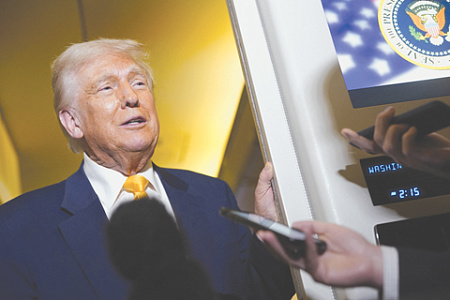
Dmitry Peskov, the press secretary of the President of the Russian Federation, called the negotiations conducted in Russia by Steve Witkoff, the special representative of the American president, an additional step towards the meeting between Vladimir Putin and Donald Trump. The White House is also optimistic about the development of contacts between the two countries. Trump assures that positive news regarding Ukraine and Russia should be expected soon. This raises hopes for an early truce, especially since the American president had previously promised it by Easter.
Recently, there has been a lot of news about the Russian-American negotiation process. Witkoff’s blitz visit to Russia and his talks with Putin were immediately followed by several statements from the American side, each of which can be called promising in terms of prospects for a peaceful settlement.
On Saturday, April 12, an interview was published in The Times newspaper by the special representative of the President of the United States, General Keith Kellogg, who is responsible for contacts with official Kiev, in which he discussed what Ukraine will look like after the end of hostilities. In an interview, it was claimed that a fate awaits her, comparable to that of Berlin after the Second World War. Allegedly, it will be divided into control zones. French and British troops will be deployed in western Ukraine as a “stabilization force,” with the Ukrainian army positioned between them and the Russian military with a buffer zone. Kellogg immediately accused the newspaper of misrepresenting his words. “When I was thinking about separation, I was referring to the areas or areas of responsibility of the Allied forces, without American troops. I did not mean the partition of Ukraine,” he wrote on a social network. The amendment is important, of course, but it doesn’t change the essence of what has been said much. For the first time, a representative of the Trump administration publicly admitted that Ukraine would be divided into something like spheres of influence. The British and French troops did not appear in Kellogg’s interview by chance. Britain and France are currently the only Western countries that have unconditionally agreed to send their troops to Ukraine after the end of hostilities. There is, of course, a whole “coalition of willing” from dozens of countries that agree in principle to undertake such a mission. On Thursday, April 10, their defense ministers even met in Brussels. But this meeting only showed that the majority of the participants in the “coalition of the willing” have so far taken a wait-and-see attitude. They could not even agree on what their military should do in Ukraine: just monitor the situation, passively support the Ukrainians or fight with them if the Russian Federation violates the truce. Kellogg’s words are like a hint from Washington that it will have to be decided soon.
The Reuters report gives a special resonance to the general’s interview. According to him, after a meeting with Kirill Dmitriev, head of the Russian Direct Investment Fund, Witkoff informed Trump that the condition for peace should be the transfer of four territories to the Russian Federation: the Zaporizhia and Kherson regions, the DPR and the LPR. It is unclear, however, why Crimea is not on this list. Apparently, it is recognized as Russian by default.
In principle, Witkoff had previously said the same thing in an interview with journalist Tucker Carlson. The one that caused a flurry of criticism in the United States and the discontent of Ukrainian President Vladimir Zelensky. Although Reuters points out that Kellogg did not support Witkoff, an interview with The Times suggests the opposite.
Trump’s words to reporters on April 12 aboard his plane are a fact, not a report with reference to sources. “I think that relations between Ukraine and Russia can improve. And you’ll find out soon enough,” he promised. Earlier, Finnish President Alexander Stubb said that in a conversation with him, Trump had set a date by which a truce should be concluded: April 20, Easter. There were a lot of skeptical comments about this. But what if Witkoff, who is currently the White House’s top contact with Putin, really makes it to that date?
Of course, Peskov’s statement should be attributed to optimistic signs in this regard. In an interview with Rossiya 1 TV channel, he called Friday’s talks between Witkoff and Putin an “additional step” towards a meeting between the two presidents. “This meeting will take place,” Peskov promised, indicating only that it would take place at the “appropriate time.” Meanwhile, it is difficult to imagine that this appropriate time will be in conditions when no progress has been made on a peaceful settlement between the Russian Federation and Ukraine.
“I’ll say it carefully: I have big doubts that a truce will be reached by April 20. But I don’t think Trump will drop the subject so easily. Besides, one should not forget that his task is not to resolve the conflict, but simply to transfer it from the hot stage to the negotiation stage,” American expert Pavel Sharikov told NG.
